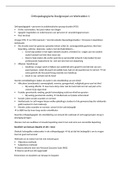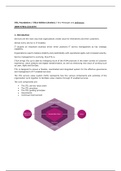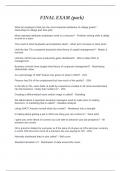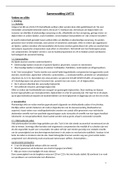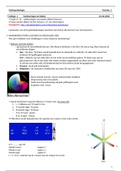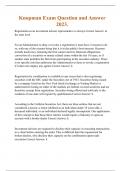Forensic Psychology
H1: Introduction
1. Towards an understanding
Forensic psychology ≠ forensic science or law enforcement
→ Forensic psychologist studies human behavior
→ Expert in (criminal) human behaviour
→ Tries to apply psychological principles to assist legal system
Forensic → ‘Forensis’ (Latin) = of the forum (market place: was a public court room)
→ Related to the law
→ Between criminology, psychology and law
2. History
Middle Ages and earlier → good and wrong related to religion, demons, witches, sinners,...
End of Middle Ages → first use of insanity
18th century → insane person= wild animal
19th → Lombroso: criminal atavism (=recognizing criminals by their physical features)
19th → development of theories about insanity and criminal behavior
1879 → first laboratory for experimental psychology (W. Wundt)
1908 → Münsterberg: ‘On the witness stand’ (book: series of essays to describe research on
eyewitness testimony, false confessions and uses of psychology in legal problems)
20th century: psychologists were more called upon to apply their knowledge to the legal
system as expert → psychology is a tool in arriving at fair and just legal outcomes
Some high-profile cases revealed the lack of fit between classical clinical psychological
approach and the legal context
→ E.g.: the use of assessment techniques that are not adapted to the forensic context
1970-1980 (US): more and more application of psychology in legal issues
→ Development of specific training, guidelines, journals, first generation assessment tools
→ A unique discipline that differs from classical clinical psychology
Experiments:
- Stanley Milgram Experiment (shocks)
- Stanford Prison Experiment
,3. Practice of forensic psychology
3.1 Behavioral sciences department (Belgian federal police)
1. Polygraph (lie detector: never conclusional evidence)
2. Database management of sexual crimes
3. Interrogation of minors
4. Behavioral analysis
- Supporting interrogations (psychologist in another room, they assist through a chat)
- Profiling
- Threat analysis
- Observation at reconstruction
- Witness protection (assessment)
3.2 Three main activities for forensic psychologists
1. Assessment
Therapeutic VS forensic assessment
- Goal: reduce psy suffering VS addressing legal question
- Relationship: care and support VS investigative and truth seeking
- Client: examinee VS whoever pays (court, attorney,...)
- Consequences: design intervention VS possible loss of liberty
- Accuracy of info: examinee generally more reliable VS questionable
Methods
→ Clinical interview
→ Psychological testing/ instruments
- Projective-, objective tests, intelligence, neuropsychological, forensic assessment
→ Collateral information
- Need for accuracy → detection of malingering (underreporting or exaggerating)
- Archival information → police reports, past charges,... (need for permission!)
- Information from partner, family, friends,...
- Information of other healthcare professionals → health records, substance abuse,...
2. Treatment
Of victims → several challenges:
- High threshold of victims (shame, cost, complexity of finding right help,...)
- Lack of forensic insight and knowledge (wrong diagnosis, wrong focus,...)
Of offenders → more challenges
- Often takes place after an individual has been in contact with the law or put under
pressure by social system → lack or absence of intrinsic motivation
- Usually involvement of a third (justice system) asking for information on the progress
- Confrontation with hostility, threats, aggression and emotional burden (PTSS,...)
→ However: study found no more risk of aggressive behavior in the forensic context
- Who’s your client? → balance empathy VS critical/suspicious attitude
,Treatment can occur when a person begins to exhibit psychological problems in prison
Estimates range that 50-90% of people in prison have a mental disorder
Estimated 20% of in-prison deaths are due to suicide
Mobley: Four types of treatment (in or after prison):
→ Management
- Reduce and eliminate acute crises, damage control
- E.g.: self-mutilation, suicidal gestures, general violence ...
→ Maintenance
- Chronic mental health issues not likely to be resolved during incarceration
- Focus on stabilization
→ Outpatient programs
- Continued supervision of those at risk
- Focus on effective coping strategies
→ Specialized programs
- Focus on specific issues (substance abuse, anger control, sexual offending,...)
3. Consultation
Assisting attorneys or court on a variety of trial-related issues
- Identifying relevant experts
- Educating on a certain area
- Evaluating the work product of an opposing expert
Consulting in policy issues
- E.g.: the government wants to tackle child abuse in sportclubs, they ask our expertise
center to develop guidelines for sportclubs or a bystander training for sport coaches
4. Three main activities but forensic psychologists could also…
Do research, offer training, give therapy,...
, H2: Psychology and Law
1. Relationship between law and psychology
Different disciplines solving problems in different ways
2. (Un)accountability
Competency to stand trial
- Present ability to consult a lawyer with rational understanding
- Rational understanding of the proceedings
- Mental state at the time of the trial, NOT at the time of the offense
- Court cannot proceed, unless the defendant is competent to stand trial
Insanity defens
=If mental state made it impossible to control behavior or influenced behavior (during crime)
=Defendant is not responsible for his or her actions due to an episodic or persistent
psychiatric disease at the time of the criminal act (US Law, code 17)
- Acquittal or internment
- No control and no criminal intent
→ Burden of proof= the accused has the burden of proving the defence of insanity by clear
and convincing evidence
Difference legal insanity VS medical insanity
→ Medical insanity= someone who is suffering from any kind of ‘mental health issue’
→ Legal insanity= the person suffering from mental illness should also have had a loss of
reasoning ability at the time of the incident
- Everyone who’s mentally ill is not automatically exempted from criminal responsibility
- A court is concerned with legal insanity, and not with medical insanity
Belgium= dichotomous
- Accountable
- Unaccountable
The Netherlands= dimensional
- Accountable
- Diminished accountable
- Unaccountable
H1: Introduction
1. Towards an understanding
Forensic psychology ≠ forensic science or law enforcement
→ Forensic psychologist studies human behavior
→ Expert in (criminal) human behaviour
→ Tries to apply psychological principles to assist legal system
Forensic → ‘Forensis’ (Latin) = of the forum (market place: was a public court room)
→ Related to the law
→ Between criminology, psychology and law
2. History
Middle Ages and earlier → good and wrong related to religion, demons, witches, sinners,...
End of Middle Ages → first use of insanity
18th century → insane person= wild animal
19th → Lombroso: criminal atavism (=recognizing criminals by their physical features)
19th → development of theories about insanity and criminal behavior
1879 → first laboratory for experimental psychology (W. Wundt)
1908 → Münsterberg: ‘On the witness stand’ (book: series of essays to describe research on
eyewitness testimony, false confessions and uses of psychology in legal problems)
20th century: psychologists were more called upon to apply their knowledge to the legal
system as expert → psychology is a tool in arriving at fair and just legal outcomes
Some high-profile cases revealed the lack of fit between classical clinical psychological
approach and the legal context
→ E.g.: the use of assessment techniques that are not adapted to the forensic context
1970-1980 (US): more and more application of psychology in legal issues
→ Development of specific training, guidelines, journals, first generation assessment tools
→ A unique discipline that differs from classical clinical psychology
Experiments:
- Stanley Milgram Experiment (shocks)
- Stanford Prison Experiment
,3. Practice of forensic psychology
3.1 Behavioral sciences department (Belgian federal police)
1. Polygraph (lie detector: never conclusional evidence)
2. Database management of sexual crimes
3. Interrogation of minors
4. Behavioral analysis
- Supporting interrogations (psychologist in another room, they assist through a chat)
- Profiling
- Threat analysis
- Observation at reconstruction
- Witness protection (assessment)
3.2 Three main activities for forensic psychologists
1. Assessment
Therapeutic VS forensic assessment
- Goal: reduce psy suffering VS addressing legal question
- Relationship: care and support VS investigative and truth seeking
- Client: examinee VS whoever pays (court, attorney,...)
- Consequences: design intervention VS possible loss of liberty
- Accuracy of info: examinee generally more reliable VS questionable
Methods
→ Clinical interview
→ Psychological testing/ instruments
- Projective-, objective tests, intelligence, neuropsychological, forensic assessment
→ Collateral information
- Need for accuracy → detection of malingering (underreporting or exaggerating)
- Archival information → police reports, past charges,... (need for permission!)
- Information from partner, family, friends,...
- Information of other healthcare professionals → health records, substance abuse,...
2. Treatment
Of victims → several challenges:
- High threshold of victims (shame, cost, complexity of finding right help,...)
- Lack of forensic insight and knowledge (wrong diagnosis, wrong focus,...)
Of offenders → more challenges
- Often takes place after an individual has been in contact with the law or put under
pressure by social system → lack or absence of intrinsic motivation
- Usually involvement of a third (justice system) asking for information on the progress
- Confrontation with hostility, threats, aggression and emotional burden (PTSS,...)
→ However: study found no more risk of aggressive behavior in the forensic context
- Who’s your client? → balance empathy VS critical/suspicious attitude
,Treatment can occur when a person begins to exhibit psychological problems in prison
Estimates range that 50-90% of people in prison have a mental disorder
Estimated 20% of in-prison deaths are due to suicide
Mobley: Four types of treatment (in or after prison):
→ Management
- Reduce and eliminate acute crises, damage control
- E.g.: self-mutilation, suicidal gestures, general violence ...
→ Maintenance
- Chronic mental health issues not likely to be resolved during incarceration
- Focus on stabilization
→ Outpatient programs
- Continued supervision of those at risk
- Focus on effective coping strategies
→ Specialized programs
- Focus on specific issues (substance abuse, anger control, sexual offending,...)
3. Consultation
Assisting attorneys or court on a variety of trial-related issues
- Identifying relevant experts
- Educating on a certain area
- Evaluating the work product of an opposing expert
Consulting in policy issues
- E.g.: the government wants to tackle child abuse in sportclubs, they ask our expertise
center to develop guidelines for sportclubs or a bystander training for sport coaches
4. Three main activities but forensic psychologists could also…
Do research, offer training, give therapy,...
, H2: Psychology and Law
1. Relationship between law and psychology
Different disciplines solving problems in different ways
2. (Un)accountability
Competency to stand trial
- Present ability to consult a lawyer with rational understanding
- Rational understanding of the proceedings
- Mental state at the time of the trial, NOT at the time of the offense
- Court cannot proceed, unless the defendant is competent to stand trial
Insanity defens
=If mental state made it impossible to control behavior or influenced behavior (during crime)
=Defendant is not responsible for his or her actions due to an episodic or persistent
psychiatric disease at the time of the criminal act (US Law, code 17)
- Acquittal or internment
- No control and no criminal intent
→ Burden of proof= the accused has the burden of proving the defence of insanity by clear
and convincing evidence
Difference legal insanity VS medical insanity
→ Medical insanity= someone who is suffering from any kind of ‘mental health issue’
→ Legal insanity= the person suffering from mental illness should also have had a loss of
reasoning ability at the time of the incident
- Everyone who’s mentally ill is not automatically exempted from criminal responsibility
- A court is concerned with legal insanity, and not with medical insanity
Belgium= dichotomous
- Accountable
- Unaccountable
The Netherlands= dimensional
- Accountable
- Diminished accountable
- Unaccountable

